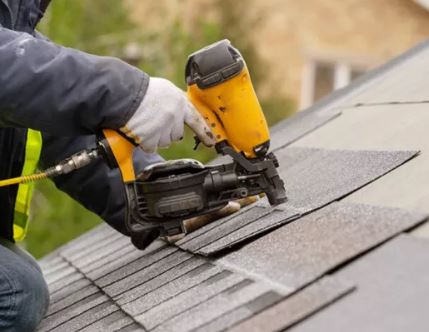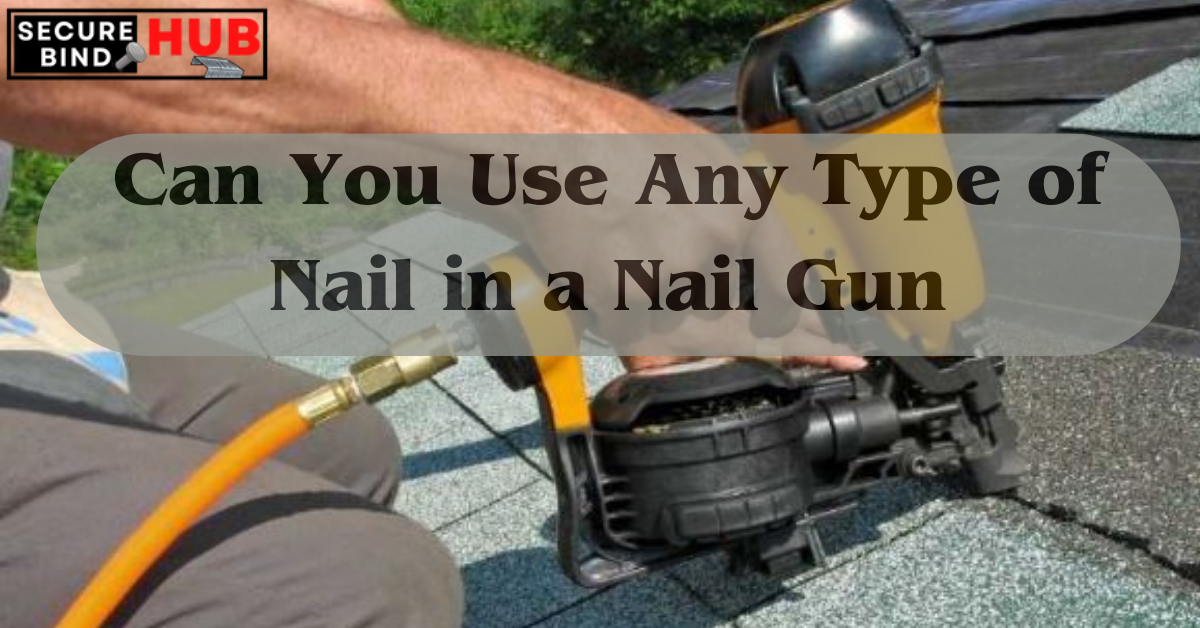Nail guns are indispensable tools for anyone involved in woodworking, construction, or home improvement projects. They allow for quick and efficient fastening of materials, saving both time and effort. However, not all nail guns are compatible with every type of nail. So, the pressing question remains: Can You Use Any Type of Nail in a Nail Gun?
In this detailed guide, we will explore the world of nail guns and the compatibility of different nail types with these powerful tools. From common misconceptions to expert advice, we’ll cover it all to help you become a nail gun aficionado.
Can You Use Any Type of Nail in a Nail Gun?

Before delving into the specifics, let’s address the central question: Can You Use Any Type of Nail in a Nail Gun? The short answer is no. Nail guns are designed to work with specific nail types, and using the wrong ones can lead to various issues, including jamming, reduced efficiency, and even safety hazards.
Types of Nails for Nail Guns
To fully understand which nails are compatible with your nail gun, you need to acquaint yourself with the various nail types available. Here are some common ones:
- Framing Nails
- Length: 2 to 3.5 inches
- Ideal for: Framing, sheathing, and heavy-duty construction projects.
- Finish Nails
- Length: 1 to 2.5 inches
- Ideal for: Trim work, cabinets, and other finishing tasks.
- Brad Nails
- Length: 5/8 to 2 inches
- Ideal for: Delicate woodworking, attaching thin moldings.
- Roofing Nails
- Length: 1 to 1.5 inches
- Ideal for: Roofing, siding, and shingle installation.
- Concrete Nails
- Length: 1 to 2.5 inches
- Ideal for: Fastening materials to concrete or masonry.
- Flooring Nails
- Length: 1.5 to 2.5 inches
- Ideal for: Securing hardwood and laminate flooring.
- Siding Nails
- Length: 1.5 to 3 inches
- Ideal for: Installing siding materials.
- Pin Nails
- Length: 1/2 to 2 inches
- Ideal for: Fine detail work, attaching small trim pieces.
Nail Gun Compatibility
Now that you’re familiar with different nail types, let’s explore their compatibility with nail guns:
Can You Use Framing Nails in Any Nail Gun?
- Framing nails are best suited for framing nail guns, which are designed for heavy-duty applications. Attempting to use framing nails in a brad nailer, for example, would not yield optimal results.
Are Finish Nails Compatible with All Nail Guns?
- Finish nails can be used in finish nailers and some brad nailers. However, ensure that the gauge and length match the nail gun’s specifications.
Using Roofing Nails in a Roofing Nail Gun
- Roofing nails are exclusively designed for roofing nail guns. Attempting to use them in other nail guns could result in damage to the tool and improper fastening.
Concrete Nails and Their Specificity
- Concrete nails are intended for use in concrete nail guns. Using them in other nail guns is not recommended due to the difference in the firing mechanism.
Flooring Nails and Their Purpose
- Flooring nails are designed for flooring nail guns. They are specialized for securing flooring materials and may not work well in other types of nail guns.
Siding Nails: Stick to the Right Tool
- Siding nails should only be used in siding nail guns. Using them in other nail guns may lead to complications during the installation process.
Precision with Pin Nails
- Pin nails are meant for pin nailers. These tiny fasteners are perfect for delicate woodworking and crafting.
Tips for Choosing the Right Nails
When it comes to using a nail gun effectively and safely, selecting the right nails is paramount. Here are some practical tips to help you make the best choices:
- Understand Your Project Type
Consider the Project Scope: Is it a framing job, finishing work, or something else entirely? The type of project you’re working on should guide your nail selection. For instance, framing nails are ideal for structural work, while finishing nails are perfect for trim and detail work.
- Know Your Materials
Assess the Material: The material you’re fastening is crucial. Different materials require different nails. For instance, hardwoods may require stronger and longer nails compared to softwoods.
- Consider the Nail Gun Type
Match Nails to Your Gun: Each nail gun type has specific nail requirements. Ensure your nails are compatible with your nail gun. Framing nail guns, brad nailers, and roofing nailers all use different nails. Consult your nail gun’s user manual for guidance.
- Gauge and Length Matter
Understand Nail Gauge: Nail gauge refers to the nail thickness. Thicker nails are stronger but may not work well with all nail guns. Consider the gauge recommended for your nail gun.
Optimal Length: The length of the nail should penetrate the material and provide adequate holding power. Too short or too long can lead to problems.
- Collation Type
Choose the Right Collation: The way nails are held together (collation) can impact how smoothly they feed into the nail gun. Be sure to use the collation type specified for your nail gun.
- Test Before Committing
Test a Few Nails: Before committing to a large project, test a few nails on scrap material to ensure they work well with your nail gun and achieve the desired results.
- Buy Quality Nails
Invest in Quality: Quality nails may cost a bit more, but they are less likely to jam or cause problems with your nail gun. Don’t compromise on nail quality.
- Safety First
Prioritize Safety: Always prioritize safety when using nail guns. Using the wrong nails can lead to accidents and injuries. Ensure that your nail gun is in good working condition, and follow safety guidelines rigorously.
- Keep an Assortment
Maintain a Variety: Depending on the variety of projects you undertake, it’s a good idea to keep a selection of nails on hand. This ensures you have the right nails for any job that comes your way.
Remember, the right nails not only make your job easier but also ensure the structural integrity and aesthetics of your project. Take the time to choose wisely, and you’ll enjoy smoother and safer woodworking experiences.
Frequently Asked Questions
Can I use any nail in a nail gun?
No, it’s essential to match the nail type with the nail gun to ensure safety and optimal performance.
What happens if I use the wrong nails in my nail gun?
Using the wrong nails can lead to jamming, reduced efficiency, and potential safety hazards.
Can I use Brad nails in a framing nail gun?
It’s not recommended, as the nail may not provide sufficient strength for framing applications.
Are there universal nails that work with all nail guns?
No, nail guns are designed for specific nail types, so there are no universal nails.
Can I modify my nail gun to use different nails?
Modifying a nail gun to use different nails is not recommended and can void warranties. It’s safer to use the right tool for the job.
Can I use nails from different manufacturers in my nail gun?
It’s best to stick to nails recommended by the manufacturer of your nail gun to ensure compatibility and performance.
Finally
The compatibility of nails and nail guns is crucial for successful and safe fastening in various projects. Remember that using the right nail type for your nail gun is essential to ensure efficiency and avoid potential issues.
So, Can You Use Any Type of Nail in a Nail Gun? The answer is no, but armed with this knowledge, you can confidently choose the right nails for your projects, ensuring a job well done.
Related Topics:
- What Gauge Nails for Fence Pickets
- What Size Air Compressor for Framing Nailer
- Paslode Nail Gun Flashing Green Light
- 21 vs 30 Degree Framing Nailer
- Can I Use Ramset Nails on Hilti Gun

